翻译的基本技巧--被动语态的翻译
英汉翻译技巧

英译汉翻译技巧翻译过程包括两个阶段:正确理解和充分表达。
理解是表达的前提,而表达是理解的目的和结果,二者缺一不可,因此,考生在做英译汉部分试题时:(1)切记不可急躁,一定要先通读全文,把握全文的主旨、内容,把握画线部分的语境。
(2)在着重理解画线部分时,首先要在语义上弄清全句的整体意思和每个单词的意思;其次要分析清楚句子结构,理出句群,找出各分句之间的关系。
(3)可考虑先打一份翻译草稿,再根据文章意义和汉语结构进行调整。
(一)词的译法1.词义的选择由于英语中一词多义的现象十分普遍,且英汉词典中给出的汉语解释未必全面,未必与英文的意思完全对等,这就给我们带来两方面的问题:其一,我们需要根据该多义词在其语言环境中的词类、搭配关系甚至是单复数形式来确定其基本意思(即“忠实”);其二,在“忠实”的原则下,如果词典上的释义显得不“通顺”,那么为了“忠实”与“通顺”的统一,我们必须立足于原意,对其加以适当的引申。
选择词义的时候,要根据词在句中的词类及上下文的搭配关系来确定。
如:The target is wrong, for in attacking the tests, critics divert attention from the fault that lies with ill informed or incompetent users.[译文]把标准化测试作为抨击的目标是错误的。
因为在抨击这类测试时,批评者没有意识到弊病来自人们对这种测试的不甚了解或使用不当。
[分析]attack的基本意思是“进攻,攻击”,但在这里的搭配是attacking the tests,显然这是指“口诛”、“笔伐”,译为“抨击”或“批评”才算准确。
divert attentionfrom的意思是“将注意力从……移开”,但文中的批评者坚持认为错在考试形式,并不是已经注意到什么而又有意转移视线。
所以这里最好译成“没有注意到”或“没有意识到”。
被动语态的翻译
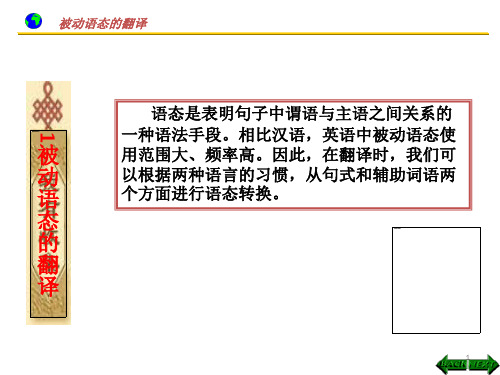
被动语态的翻译
[<]
英语中以it 做形式主语,以被动语态作谓语,其后跟一个由that引导的主语从句的结构很多。这种结 构在译成汉语时,除把it一律省略外,通常有两种处理方法: 1.在被动语态前加“人们”、“有人”、“我们”、“大家”等词 2.用“据……”等短语译出
2). It is estimated that Americans spend up to five years of their lives in that tedious, stressful but unavoidable process known as waiting. 据估计,美国人一生中, 在乏味而令人厌烦, 却又躲避 不掉的等待上所耗费的时间,竟达五年之多。 英语中这种it做形式主语的被动句型在各类文章中比 比皆是,汉译时一般均按主动结构译出。即将原文中 的主语从句译在宾语的位置上,而把it做形式主语的主 句译成一个独立语或分句。常见的固定结构如:
4) The monkeys were given sweet potatoes by scientists who wanted to attract them to the shore of an island.
科学家们给猴子白薯,想把它们引到海岛的岸边。
10
被动语态的翻译
[<]
B . 把被动语态译成汉语主动句 1). His pride must be pinched. 他这股傲气应该打下去。
17
被动语态的翻译
1.4 “It+ be+ past participle + that引导的从句”句型的翻译 A. 不加主语 It is hoped that... 希望…… It is reported that … 据报道…… It is said that... 据说…… It is supposed that… 据推测…… It may be said without fear of exaggeration that… 可以 毫不夸张地说…… It must be admitted that... 必须承认…… It must be pointed out that... 必须指出…… It will be seen from this that… 由此可见……
翻译技巧3--词序调整法-分译和译--被动语态翻译
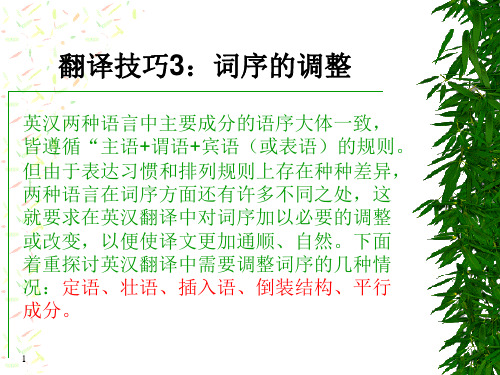
Exercise 1. He treats his sick wife poorly. 他待他有病的妻子不好。 2. Appearances are deceptive. 3.His refusal is not final. 外貌是靠不住的。
他的拒绝并非不可改变。
翻译技巧3: 翻译技ቤተ መጻሕፍቲ ባይዱ :词序的调整
英汉两种语言中主要成分的语序大体一致, 皆遵循“主语+谓语+宾语(或表语)的规则。 但由于表达习惯和排列规则上存在种种差异, 两种语言在词序方面还有许多不同之处,这 就要求在英汉翻译中对词序加以必要的调整 或改变,以便使译文更加通顺、自然。下面 着重探讨英汉翻译中需要调整词序的几种情 况:定语、壮语、插入语、倒装结构、平行 成分。
并列成分的词序调整 英语中并列成分的词序一般按照逻辑上的轻重、前后、 因果或部分-整体的顺序安排,而汉语通常将较大、较 强、较突出的成分前置。
elementary and secondary schools 中小学 heal the wounded and rescue the dying 救死扶伤 food, clothing, shelter and transportation 衣食住行
I have read your articles, but I expect to meet an older man. 我读过你的文章,但没料想你这样年轻。
1、肯定译作否定 I regret to learn that you have failed in the examination. 得知你未能通过考试,深表遗憾。 She missed the point of his joke. 她没有听懂他讲的笑话。 On Sunday Jim idles away his time. 星期天吉姆无所事事。 You may safely say so. 你这样说错不了。
被动语态的翻译技巧

被动语态的翻译技巧
被动语态是一种句子结构,在中文翻译中,可以使用以下技巧来表达被动语态:
1. 改变主谓结构:将主语变为宾语,将宾语(或部分宾语)变为主语。
例如,将英语句子"John was given a present by Mary."翻译成中文时,可以改为"玛丽给了约翰一份礼物。
",将"John"变为宾语,将"Mary"变为主语。
3. 调整语序:在中文翻译中,可以根据需要来调整句子的语序,以表达被动意义。
例如,将英语句子"The letter was sent yesterday."翻译成中文时,可以调整语序为"昨天这封信被寄出了。
",使得被动含义更明显。
4. 使用"被动"结构的句型:在中文中,有一些特定的句型可以表达被动意义,如"被+动词+主语+宾语"的结构。
例如,将英语句子"The window was broken by the wind."翻译成中文时,可以使用"被+动词+主语+宾语"的结构,翻译为"窗户被风给吹坏了。
"。
以上是一些常用的被动语态的中文翻译技巧,具体的翻译方法还需要根据语境和句子结构进行灵活运用。
被动语态的反翻译技巧

五、注意哪些动词不用于被动语态五、注意哪些动词不用于被动语态B>1. 不及物动词没有被动语态。因为不及物动词没有宾语,所以若将其用于被动语态则没有主语,故不能用于被动语态。但是值得注意的是,有些英语中的不及物动词,译成汉语时却可能是“及物”的,很容易出错,这类动词如:take place(发生),happen(发生),)come about(发生),break out(爆发),appear(出现),disappear(消失),last(持续),arise(出现,发生)等:Influenza usually breaks out in winter. 流感通常发生在冬季。Use this money when the need arises. 有需要时就使用这笔钱。2. 英语中的静态动词(如have, lack, fit, hold, suit, resemble 等)通常不用于被动语态:My shoes don’t fit me. 我的鞋不合适。The young man lacks experience. 这个年轻人缺乏经验。< experience. lacks>
六、注意两类被动句型的相互转换英语中有一种主动句可以转换成两种被动句型,它们通常是一些表示客观说明的句子。如:People believed that she is honest. 大家相信她是诚实的。It’s believed that she is honest. 大家相信她是诚实的。She is believed to be honest. 大家相信她是诚实的。比较上面两类被动句型可以发现,一类是“it+be+过去分词+that“it+be+从句”,另一类则是“主语+be+过去分词+不定式”(其中的“主语”为前一类句型中that从句中的主语ace=宋体>为前一类句型中),通常可用于这两类被动句型的动词有assume, believe, expect, fear, feel, know, presume, report, say, suppose, think, understand等,比较(同时注意其中时态和动词形式的变化):It’s known that he was a good singer. / He is known to have been a good singer. 大家知道他曾是位优秀的歌手。It’s reported that he was driving fast. / He is reported to have been driving fast. 据说他当时车开得很快。
翻译的基本技巧--被动语态的翻译.
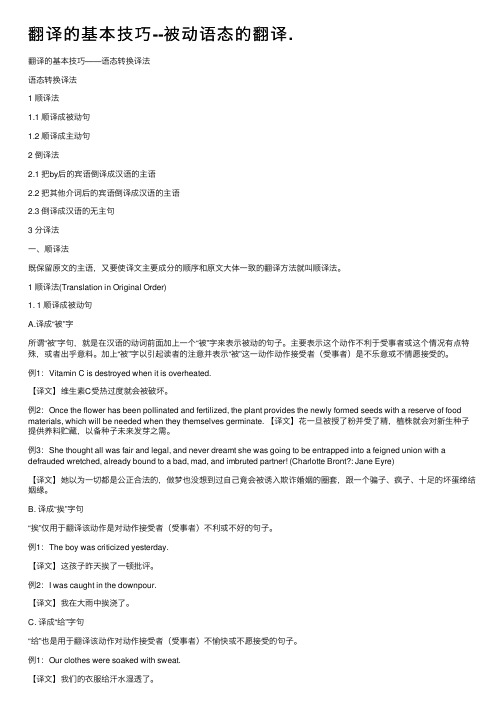
翻译的基本技巧--被动语态的翻译.翻译的基本技巧——语态转换译法语态转换译法1 顺译法1.1 顺译成被动句1.2 顺译成主动句2 倒译法2.1 把by后的宾语倒译成汉语的主语2.2 把其他介词后的宾语倒译成汉语的主语2.3 倒译成汉语的⽆主句3 分译法⼀、顺译法既保留原⽂的主语,⼜要使译⽂主要成分的顺序和原⽂⼤体⼀致的翻译⽅法就叫顺译法。
1 顺译法(Translation in Original Order)1. 1 顺译成被动句A.译成“被”字所谓“被”字句,就是在汉语的动词前⾯加上⼀个“被”字来表⽰被动的句⼦。
主要表⽰这个动作不利于受事者或这个情况有点特殊,或者出乎意料。
加上“被”字以引起读者的注意并表⽰“被”这⼀动作动作接受者(受事者)是不乐意或不情愿接受的。
例1:Vitamin C is destroyed when it is overheated.【译⽂】维⽣素C受热过度就会被破坏。
例2:Once the flower has been pollinated and fertilized, the plant provides the newly formed seeds with a reserve of food materials, which will be needed when they themselves germinate. 【译⽂】花⼀旦被授了粉并受了精,植株就会对新⽣种⼦提供养料贮藏,以备种⼦未来发芽之需。
例3:She thought all was fair and legal, and never dreamt she was going to be entrapped into a feigned union with a defrauded wretched, already bound to a bad, mad, and imbruted partner! (Charlotte Bront?: Jane Eyre)【译⽂】她以为⼀切都是公正合法的,做梦也没想到过⾃⼰竟会被诱⼊欺诈婚姻的圈套,跟⼀个骗⼦、疯⼦、⼗⾜的坏蛋缔结姻缘。
被动语态的翻译
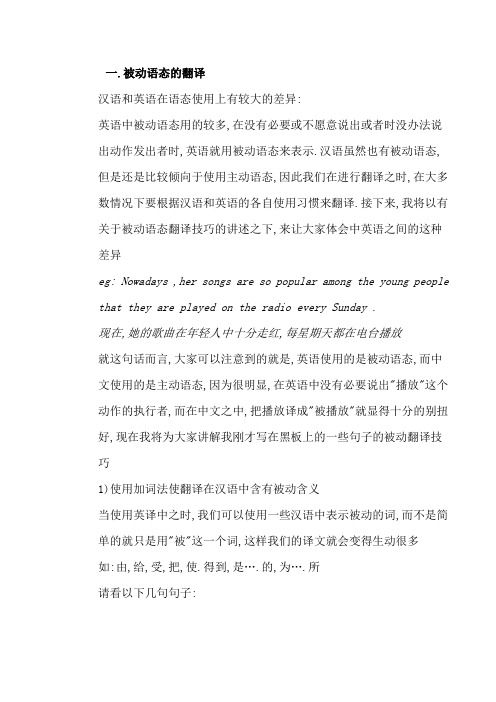
一.被动语态的翻译汉语和英语在语态使用上有较大的差异:英语中被动语态用的较多,在没有必要或不愿意说出或者时没办法说出动作发出者时,英语就用被动语态来表示.汉语虽然也有被动语态,但是还是比较倾向于使用主动语态,因此我们在进行翻译之时,在大多数情况下要根据汉语和英语的各自使用习惯来翻译.接下来,我将以有关于被动语态翻译技巧的讲述之下,来让大家体会中英语之间的这种差异eg: Nowadays ,her songs are so popular among the young people that they are played on the radio every Sunday .现在,她的歌曲在年轻人中十分走红,每星期天都在电台播放就这句话而言,大家可以注意到的就是,英语使用的是被动语态,而中文使用的是主动语态,因为很明显,在英语中没有必要说出"播放"这个动作的执行者,而在中文之中,把播放译成"被播放"就显得十分的别扭好,现在我将为大家讲解我刚才写在黑板上的一些句子的被动翻译技巧1)使用加词法使翻译在汉语中含有被动含义当使用英译中之时,我们可以使用一些汉语中表示被动的词,而不是简单的就只是用"被"这一个词,这样我们的译文就会变得生动很多如:由,给,受,把,使.得到,是….的,为….所请看以下几句句子:eg: Heads of federal departments are named by the President , and judges are either elected directly by the people or are appointed by elected officials .联邦政府各部部长由总统任命,法官由人民直接选举,或者由选举出来的官员任命Though some people have been laid off because of automation , most have been absorbed by new industries and by the growth of service and leisure industries.有些人由于自动化而失了业,但是多数人为新兴产业及服务休闲业的扩大而吸收If a computer can be made complex enough , it can be as creative as we.如果能把电脑造的足够复杂的话,那么电脑就能像人一样富于创造力It is frequently said that computers solve problems only because they are "programmed" to do so .人们常说,电脑之所以能解决问题,只是因为它们给输入了解决问题的"程序"The quality of the product was limited by the cost.产品的质量受到了成本的限制The effort of the government was recognized by the public. 政府的努力得到了公众的承认2)直接译成主动结构*有些句子在汉语中,使用主动结构更为合适We both believe that through vigilance and strength , in your words , a war can be postponed , and in our words , war can be avoided.我们都认为, 有了警惕和实力,用你们的话说, 就可以推迟战争;用我们的话说,就可以避免战争.When the Constitution was written in 1787, there were only 13 states.1787年草拟宪法时,美国只有13个州What we say here will not be long remembered.我们这里所讲的话, 人们不会长久地记住**常用结构的翻译It is said/reported/mentioned/pointed out that , 结构常译成主动结构It is said that the man was murdered by the black man.据说是那个黑人谋杀了那个人.It is reported that the new president is going to pay an official visit to Russia.据报道,新任总统将对俄罗斯进行一次正式访问It is know to all that China's opening to the outside world will have a positive influence on its economic development .大家都知道,中国对外开放将对其经济发展起积极的作用<补充练习>Commercial cargoes are transported by highway, water and rail . One recent innovation is "containerized" cargo. At the factory, crates of goods are placed in large metal containers on wheels , and the containers are sealed and hitched to trucks to be taken to railroad centers or ports , where large cranes lift them on to freight cars, barges or ships.商业货物由公路,水路与铁路来运输,近来发明了"集装箱"货运. 在厂家就把货物装入带轮子的大型金属集装箱内,装箱密封后,挂在卡车后拉到铁路编组站或港口,用大吊车装上货物车厢,驳船或轮船.Crime is partly a result of bad material conditions : certainly it is most prevalent among people whose lives are not satisfactory in obvious ways---people without a settled home , with parents separated or divorced , victims of various kinds of misfortune , including poverty and lack of education . But bad social conditions , in the obvious material sense , can hardly be accepted as the main explanation for a rapid increaseof crime in the 1960s and 1970s . There are after all fewer people suffering from the bad conditions than before , and it is much easier to make a very satisfactory living by honest work now than it was forty years ago , on indeed at any previous time .The problem is shared with the rest of western civilization , and beyond it .犯罪的部分原因是物质条件差;犯罪当然在生活明显不满意的人中最普遍,没有固定住处者, 父母分居或离婚者,各种灾祸的受害者,其中,包括贫困和缺乏教育者.可是社会物质条件差, 不能认为是六,七十年代犯罪剧增的主要原因.毕竟受穷者比以前少了,现在通过正当职业谋得相当满意的生计,比40年前,以至以往任何时候都容易多了. 这个问题在整个西方,以及其他地区都存在.二.人名,地名的英译英语人名,地名,可以查找工具书,比如英汉辞典等等中级口译的人名地名的翻译相对来说是比较简单的,我们翻译人名,地名必须遵循"音译"的原则.必须注意的是:1) 用音译,慎用意译如:人名Wall, Sleep,译成:"沃尔"与"斯利普",不可译成"墙"与"睡".地名China同样不可译成"陶瓷",这也是众所周知的事了2) 人名中姓和名之间,用圆点间隔,如John Thomas Smith "约翰.托马斯.史密斯".3) 要熟记一些常用的译名比如:Franklin Roosevelt 罗斯福 Winston Churchill 邱吉尔Napoleon 拿破仑 Aristotle 亚里士多德Socrates 苏格拉底 New York 纽约New Orleans 新奥尔良 Los Angeles 洛杉矶Detroit 底特律 Chicago 芝加哥平时就多看看有关资料,也不一定要全背出,只是心里要留个底儿,这样就不会闹笑话了词在不同语境的翻译技巧在我们的翻译教程之中第12页,就有关于see在不同语境情况之下的不同翻译,这说明要准确的译出文章中关键词的意思,首先要注意语境的把握和上下文的搭配关系1) company的翻译He is fond of company.他爱交朋友Two is company, but three is none.两人成伴,三人不欢Among the company was an old man.这群人中有位老人Who keeps company with the wolf , will learn to howl.跟狼在一起,就会学会狼叫("近墨者黑".)I fell into company with him .我偶然与他相识Misery loves company.同病相怜The host amused the company with singing .主人用歌唱来招待宾客He is employed in an electronic company.他在一家电器公司工作2) 红与red的译法英语中有redShe was dressed in red.她身穿红衣When he started criticizing my work , I really saw red.他竟批评起我的工作来了,我立即火冒三丈汉语中有"红"There has never been a cross word between the two of them, 他俩从未红过脸He won a prize because his lucky star shone bright.他鸿(红)运当头因而中奖3) good的译法His mother was a good Christian.他母亲是个虔诚的基督教徒Franklin was renowned for his good deeds富兰克林以他的德行而名扬四海Helen is as good as gold----most of the time.海伦很乖----大部分时间如此Mike is getting on in years , but both his hearing and eyesight are good.迈克已上了年纪,但他仍然耳聪目明The boss needs another good typist.老板还需要另外一名技术熟练的打字员His son had a good beating他儿子被狠狠地揍了一顿She has good looks她长得漂亮<补充练习>THE HUMMING-BIRDOf all animated being this is the most elegant in form and the most brilliant in colors. The stones and metals polished by our arts are not comparable to this jewel of Nature. Her masterpiece is this little humming-bird , and upon it she has heaped all the gifts which the other birds may only share. Lightness, rapidity , nimbleness , grace and rich apparel all belong to this littlefavorite, The emerald , the ruby , and the topaz gleam upon it dress. It never soils them with the dust of earth , and in its aerial life scarcely touches the turf an instant . Always in the air , flying from flower to flower, it has their freshness as well as their brightness. It lives upon their nectar , and dwells only in the climates where they perennially bloom.在一切生物中,要算蜂鸟体型最优美,颜色最鲜艳.经过工艺加工得各种宝石和金属是无法跟这个大自然的珍宝媲美的.这种小蜂鸟是大自然的杰作,大自然把其他鸟类只能分享的种种天赋全部慷慨地给了它.这个小宠儿具有轻盈,敏捷,灵活,优雅以及羽毛绚丽等一切妙处.那翠绿的,艳红的,嫩黄色的羽毛闪闪发光.蜂鸟从不让它的羽毛沾染尘土,它生活在天空中,一刻也不碰到草皮.它总是在空中飞翔,从花丛飞向花丛;它像花一样新鲜,又像花一样艳丽.蜂鸟靠花蜜为生,它只生活在鲜花盛开的地带.三.代词的翻译1)人称代词的翻译汉语之中人称代词用得比较少.在英语里,凡是能用人称代词取代名词的地方,都须用代词,而不重复名次.因此,人称代词在英语文章中随处可见,翻译要服从汉语习惯,不能简单的用词对词的方法处理比如下面的例子中将所有的"they"都译成他们,就会显得不那么自然2)物主代词的翻译除了人称代词含义是采取还原其所代替的名词之外,英语里的物主代词代替句中做主语的名次是,我们也要重复其做主语的名词,是译文更具体,更明确如下面的例子中将所有的their都译成他们的就会显得不自然Credit cards enable their holders to obtain goods and services on credit . They are issued by retail stores ,banks, credit-card companies to approved clients. The bank or credit-card company settles the client's bills, invoicing him monthly and charging interest on any outstanding debts. Their profit comes from the high rate of interest charged , the card-holders' subscriptions ,and the fees paid by some organizations that accept cards. 信用卡能使持卡人通过赊账的方式购买商品,得到服务.信用卡由零售商店,银行和信用卡公司发放给经过批准的客户,银行或信用卡公司结清客户的账单,按月给客户开列其消费清单,收取欠款的利息.这些金融机构的利润来自所收取的高额利息,持卡人致富的认购费以及接受信用卡消费的单位交纳的代理费their代表credit card,因此their holders 表示"持卡人"They代表credit card,因此they在此翻成"信用卡"Him代表client,因此him在此翻成"客户"Their代表the bank or credit-card company ,因此their 在此翻成"以上这些金融机构"<补充材料>The Americans is trained from childhood toquestion ,analyze ,search .Even in the primary grades , children are taught to use libraries , and to search for new ideas . By the time they are 14,15,and 16, many young scholars are making original and valuable contributions in all fields of science from astrophysics to oceanography. Industry is so aware of this untapped resource that each year , through national competitions, it offers tremendous awards among teen-agers in order to seek out (and later employ) the brilliant , inquiring minds which they find scattered across the country.美国人从小就训练孩子去提问,分析,探索.连小学生也教会使用图书馆,教会探寻新思想.许多小学者到14,15,16岁,就上至天体物理,下到海洋学,在某个学科中做出了独到的,宝贵的贡献.实业界深深了解这个未开发的资源,每年都搞全国性竞赛,给青少年提供巨额奖金,以发现(以后雇用)散布于全国的孜孜于搞学问的人才.四.定语从句的翻译定语从句在英语中大量出现.有长有短,结构有繁有简,对先行词的限制有强有弱,有时起着补充说明的作用,或者在逻辑上表示原因,目的,条件,让步和结果等等意义.因此对定语从句的翻译显得尤其重要,以下我将介绍给大家一些定语从句翻译的技巧1) 压缩法把英语的定语从句压缩成汉语的一个句子成分,也就是译成汉语中带"的"词组,当定语从句叫简短,则把这个带"的"汉语定语词组置于被修辞的词语之前No doubt there are questions or principles involved which can not be ignored and underestimated.无疑,这里涉及人们不能忽视或低估的原则问题Law offers us our best hope of overcoming the differences that prevail the world.法律使我们对克服世界上普遍存在的分歧有了最大的希望But Miggle's laugh , which was very infectious , broke the silence.但是,密格尔的富有感染力的笑声打破了沉默The deterioration of the international situation , which I noted in the introduction to the annual report last year , has continued.我在去年的年度报告导言中提到的那种国际形势的恶化一直在继续2) 拆译法如果定语从句冗长复杂,不论是限制性的或是非限制性的,往往可以译成并列句,放在主句的前后,偶尔还可以完全脱离主句而独立成句He will show her the place where they could make her look a proper dame----for next to nothing .他可以带她到那个地方,在哪儿他们会把她打扮成一个漂亮的少女,而且花不了几个钱I told the news to Robert, who told it to his friend Larry and soon the news spread all over the campus.我把消息告诉了罗伯特,他又告诉了他的朋友莱里,消息很快在校园里传开了They are striving for the ideal which is close to the heart of every Chinese and for which in the past ,many Chinese have laid down their lives.他们在为实现一个理想而奋斗,这个理想是每个中国人所珍爱的,许多中国人曾为之献出自己的生命He had talked to Vice-President Nixon, who assured him that everything that could be done would be done.他和副总统尼克松谈过话,副总统向他保证,凡是能够做到的,一定尽力去办.3) 转译法英语中有些定语从句在逻辑上对主句起着状语的作用,说明原因,目的,结果,条件和让步等等关系.汉译时应从原文的字里行间审定这些逻辑关系,然后译成汉语相应的偏正复句.The strike would prevent the docking of ocean steamships , which require assistance of tugboats.罢工使远洋轮不能靠岸,因为靠岸需要拖船的帮助Chinese trade delegations have been sent to African countries , who will negotiate trade agreement with the respective government.中国派出贸易代表团前往非洲各国,以便与这些国家的政府商谈贸易协定My uncle , who will be seventy tomorrow , is still a keen sportsman .尽管我大伯明天就满70岁了,但他仍然热衷于户外运动<补充材料>So, let us , in these next five days , start a long march together , not in lockstep, but on different roads leading to the same goal , the goal of building a world structure of peace and justice in which all may stand together with equal dignity and in which each nation ,large or small , has a right to determine its own form of government , free from outside interference or domination. 因此,让我们在今后的5天里一起开始一次长征吧,不是在一起迈步,而是在不同的道路上向着同一个目标前进.这个目标就是建立一个和平和正义的世界结构,使所有的人都在一起享有同等的尊严,使每一个国家,不论大小,都有权决定自己政府的形式,而不受外来的干涉和统治.THE IMPORTANCE OF SCIENTIFIC EXPERIMENTSThe rise of modern science may perhaps be considered to date as far back as the time of Roger Bacon , the wonderful monk and philosopher of Oxford , who lived between the years 1214 and 1292. He was probably the first in the middle ages to assert that we must learn science by observing and experimenting on the things around us ,and he himself made many remarkable discoveries. Galileo, however , who lived more than 300 years later(1564 to 1642), was the greatest of several great men , who in Italy, France , Germany , or England , began by degrees to show how many important truths could be discovered by well-directed observation. Before the time of Galileo, learned men believed that large bodies fall more rapidly towards the earth than small ones , because Aristotle said so . But Galileo, going to the top of the leaning Tower of Pisa, let fall two unequal stones , and proved to some friends , whom he had brought there to see his experiment, that Aristotle was in error. It is Galileo's spirit of going direct to Nature, and verifying our opinions and theories by experiment , that has led to all the great discoveries of modern science.科学实验的重要性现代科学的兴起也许要追溯到罗杰.培根的时代.罗杰,培根是牛津杰出的僧侣和哲学家,他出生于1214年,死于1292年.他可能是中世纪第一个提出我们必须通过对周围事物进行观察和实验来学习科学的人,他自己也有许多卓越的发现.然而,生活在三百多年之后的伽利略(1564-1642),却是好几个伟大人物中最伟大的一个,这些人在意大利,法国,德国和英国开始逐步使人们看到许多重要的真理是可以通过掌握得当的观察去发现的,在伽利略之前,学者们相信大的物体掉到地面比小的物体要快,因为亚里士多德是这样说的.可是,伽利略登上比萨斜塔的顶端,让两块体积不相等的石头同时落地,从而向一些他带去观看实验的朋友们证明亚里士多德错了.正是伽利略的这种直接到大自然中去通过实验来证明我们的判断和理论的精神,导致了现代科学的伟大发现五.词类转化技巧英语和汉语的大多数词类在互译时均可转换,其中常见的有以下几种1) 动词-----名词的相互转译They are waiting for a sight of the Vice President passing by. 他们在等候观看副总统经过那儿We can house you if the hotels are full.如果旅馆都客满了,我们可以给你提供住处Now , nobody wants to seem to claim superiority, and an agreeable effect of this is the greater informality of relationships all round.现在没有人妄自尊大,其令人愉快的效果是,四周围关系更加随便融洽2) 形容词----副词的相互转译Nowadays, children may be happy to read novels in a clean library.现在,孩子们会十分高兴地在干净的图书馆看书On this question , people of different age groups think differently.关于这个问题,不同年龄组的人有不同的想法In the ten years since normalization , we have witnessed the rapid expansion of the relations between our two countries. 自关系正常化以来的10年里,我们看到了两国关系发展迅速3) 介词---动词介词with的动词化译法She saw a brook with red flowers and green grass on both sides . 她看到一条小溪,两岸长着红花绿草The dog slunk away with his tail between his legs.狗夹着尾巴偷偷地走开了Any man with eyes in his head can see that he is exactly like a pole.任何头上长眼睛的人都看得出,他完全像根竹竿<补充练习>The shape of the world is changing almost as dramatically as this city's skyline. Today the cold war is over . The risk ofthe global nuclear conflict has been greatly reduced and the free flow of goods and ideas is bringing to life the concept of a global village. But just as all nations can benefitfrom the promise of this new world , no nation is immune to its perils. We all have a stake in building peace and prosperity, and in confronting threat that respects no borders---terrorism and drug trafficking, disease and environmental destruction. To meet these challenges most effectively, China and the United States must act in concert. Some argue that with the Cold War's end , the strategic importance of the US-China relationship has diminished . I believe they have it exactly backwards. As a new century begins , the importance of strengthening the ties between the United States and China will grow even greater.世界的面貌正在发生引人注目的变化,其变化之快几乎就像这座城市的空中轮廓.今天,冷战已经结束.全球核冲突的危险性已大大减小,商品和思想的交流正在激发地球村的概念.难事,正如世界各国会受益于这个新世界的美好前景,没有一个国家能免遭其祸害.缔造和平与繁荣,抵御不分国界的诸多威胁---恐怖主义,贩毒,疾病和环境破坏,这些与我们大家都有着利害关系.为了最有效地迎接这些挑战,中国和美国必须协力行动.有些人说,随着冷战的结束,美中关系的战略意义已经减弱了.我认为这些人刚好说反了.随着新世纪的开始,加强美国和中国的联系,其重要性将变得更大.六.加词的技巧所谓加词就是在汉译中添加必要的词使译文的意思明白无误,有些句子在翻译时需要添词The basic problem is that big cities are no longer functional.A handful of cities ----New York, San Francisco , maybe Boston---are redefining their roles. But the rest are losing their in society . We don't need them anymore.根本问题是,大城市不再起作用.有少数几个城市----纽约,旧金山,可能还有波士顿----正在重新确定各自的作用.但是其他城市正在失去它们在社会上的地位.我们不再需要这些城市了.Reading makes a full man ; conference a ready man ; writing an exact man .读书使人充实,谈话使人敏捷,写作使人准确He is more concerned about others than about himself.他关心别人比关心自己更多Better be wise by the defeat of others than your own ,从别人的失败中吸取教训比从自己的失败中吸取教训更深刻1) 在英语不及物动词后面添加名词Before he went to Africa , he learned how to ride and shoot. 在去非洲前,他学会了怎样骑马和射箭She had her hands full this morning - washing , cooking , and cleaning .她今天早上忙个不停-----洗衣服,烧饭,收拾房间2) 在英语数词后面增加量词She has many questions for her math teacher.她有一大堆问题要问数学老师3) 某些-ed分词前面加了the之后,代表一类人或一类事物The wounded was a policeman .受伤的人是警察4) 为了更好的理解原文,汉译时需要增词Do you agree with me in doing translation strictly according to the principles studied.你赞不赞成我的看法:在进行翻译的过程中,应该严格遵守所学的规则His mother is old and weak.他母亲年老而体弱Standing together, we can further peace and security. Great nations, if adversaries, cannot draw from each other's strengths.站在一起,我们就能推进和平与安全.如果伟大的国家互相为敌,那么,它们便无法相互汲取长处"if adversaries(n)"是个省略句,相当于"if they become adversaries"Nobody could count on his restraint or rationality.谁也不能指望他会采取克制和讲道理的态度<补充材料>Dolphins , like whales , must surface to breath air through a blowhole on top of their heads. Dolphins are social animals and love company. Many of them , in fact , even enjoy being around humans . It is not uncommon to hear of dolphins giving rides through the water to humans. In additions to being playful, dolphins are helpful to men . For example, as early as 400 B.C . the Greek poet Arion was saved from drowning by a dolphin . From then until now , dolphins have been helping swimmers who are in trouble. Swimmers, however are not the only humans they help. In some parts of the world , they can be counted on to help men catch fish. Moreover , dolphins are very intelligent. A dolphin's brain resembles a human brain , but it is large. Consequently, some people claim that dolphins are really smarter than men . Of course, there is no way of proving this point. Brain size is not an absolute measure of intelligent. Furthermore measuring dolphins' intelligence on other ways is not possible since men cannot fully communicate with them . Apparently, however, dolphins communicate with each other . At any rate , they make whistling, clicking and buzzing sounds which seem to be at least a form of language . So far , however , men have not been able to figure out the communication code the dolphin use.海豚与鲸一样,需要不时浮出水面以其头顶上的鼻孔来呼吸.海豚是群居动物,爱结伴.事实上,不少海豚还以与人相处为乐,它们在水中供人乘骑之事也是常有所闻的除了可爱逗趣之外,海豚对于人类是极有帮助的.例如,早在公元前400年希腊诗人艾里昂就因溺水而被一头海豚救起.至今为止,海豚一直在帮助遇到麻烦的游泳者.不仅如此,它们还能帮助人们捕鱼更有甚者,海豚智力发达.它的大脑与人类的相似,但容量更大.因而有人宣称,海豚真的比人聪明.当然,现在没法证明这一点.脑容量并不是一个决定聪敏程度的检测标准.还有,由于人们无法完全同海豚进行交流.不管怎样说,它们发出的哨音,卡嗒声和嗡嗡声等至少是一种语言的形式.但是,至今为止人们上不能解释海豚语言交流的密码七.省略的翻译技巧英译汉过程中,译文要符合汉语的表达习惯在汉语中代词和连接词用的不多,因此有时候我们就将这些词在翻译过程中省去,以下我将给大家分类举例说明具体的翻译省略技巧1) 连接词的省略有时,and 和 or 没有必要翻译出来Most Americans have great vigor and enthusiasm.大多数美国人精力充沛,热情高涨They have courage and do not give in easily.他们有勇气,不轻易屈服Foreigners sometimes complain, however , that they have little interest in or knowledge of the outside world.然而,外国人却有时抱怨说,美国人对外部世界漠不关心,一无所知Promote physical culture and build up the people's health . 发展体育运动,增强人民体质.下句中before也没有必要翻译出来Never get on or off the bus before it comes to a standstill 车未停稳,切勿上下2) 冠词的省略英译汉过程中,不定冠词a, an除了表示"一"这个数量概念时需要译出之外,其他情况下往往省略不译They are prepared to take the initiative , even when there is a risk in doing so .他们做事会采取主动,即使这样做要冒风险,也在所不辞He is an Englishman , and not an American .他是英国人,不是美国人They have a wide knowledge of everyday things , and a keen interest in their particular city and state.他们对日常事情所知甚广,对所在的城市和州深为关切定冠词the的省略见下例Is the sole aim of most Americans to make money and possess luxuries which could be called excessive?赚钱和拥有可以称得上过多的奢侈品,是不是大多数美国人的唯一的目标The use of bacteriological weapons is a clear violation of international law.使用细菌武器显然是违反国际法的The individual American is generous, but the American nation is hard.美国人作为个人是慷慨的,但美国人作为一个民族则是吝啬的3) 代词的省略当代词做宾语时,说话人和听话人,或者读者都知道指什么,汉译时需要省略If you like the books , you can take them with you .如果你喜欢这些书,就拿去吧They pride themselves on their independence , their right to make up their own minds.他们为能独立行事,为有权做出自己的决定而感到骄傲4) 介词的省略*有些表示时间的介词可以省略When the Constitution was written in 1787, there were only 13 states.1787年起草宪法时,只有十三个州*有些表示地点的介词的省略What scenic spots are there in Shanghai ?上海有什么风景区?*有些与名词到搭配的介词可以省略Their skyscrapers , bridges and dams often have a splendor which matches in beauty and scales the country's natural wonders. 他们的摩天大楼,桥梁和水坝往往气势壮观,与美国的自然奇观之壮美和恢弘相得益彰<补充练习>ANIMAL AND MACHINEThe body of an animal may well be compared with some machine like a locomotive engine. Indeed ,the animal body is a machine . It is a machine composed of many parts , each part doing some particular kind of work for which a particular kind of structure fits it; and all the parts are dependent on each other and work together for the accomplishment of the total business of the machine. The locomotive must be provided with fuel , such as coal or wood or other combustible substance , the consumption of which。
英语被动语态的翻译技巧

英语被动语态的翻译技巧摘要:英文句子使用被动句的频率要比汉语高的多,这是英汉两种语言显著差异之一。
初学者甚至一些英语专业的学生在翻译被动句的时候经常出错或翻译的比较生硬。
因此,英译汉时要特别注意被动语语态的处理,翻译时一定要符合书面语言的要求,避免生硬的翻译。
被动语态翻译时可以采用:被动变主动、用“被”的替代词、用“可以”及逆序法等技巧。
关键词:英汉翻译;被动句;翻译技巧一般来说,汉语句子的被动结构使用的较少,因为从习惯上讲,“被”在中文里往往被认为带有贬义。
而英文则刚刚相反,英语中的被动语态使用的频率非常高,这是因为:(1)被动结构相对于主动结构更少主观色彩,这也就是科技英语中被动语态更为常见的主要原因;(2)被动结构更能突出主要特征和说明对象;(3)在很多情况下被动结构比主动结构更加简短。
那么我们遇到英文的被动结构时应该采取什么样的方法才能使翻译看起来更加通顺得体呢?笔者认为翻译被动结构时一般采用下列几个方法。
一、被动变主动把英文的被动结构翻译成汉语的主动结构,这是最常用的技巧。
这种方法又可以分为下面三种:1、被动语态的主语译成中文时仍作主语。
例:The report was finished yesterday.报告在昨天完成了。
Money was used in the construction of the city infrastructure or medical care.钱要么用在城市基础设施建设上了要么用在了医疗保健上了。
分析:上面两个句子用“被动变主动”的方法就非常适合,因为原来的句子里没有宾语,不存在强调哪个部分的问题。
由此可见,在被动语态的句子中,若没有宾语则用“被动变主动”的方法最合适。
2、被动语态的主语变宾语,同时增加人们、大家等词语作主语。
例:Newspaper, it is often said, keeps one informed of the latest development in science and technology and d provides any kinds of entertaining and instructive information.人们常说,报纸使人熟悉科技领域的最新发展变化,并能为读者提供各种即有教育意义又有趣的信息。
英语被动语态的汉译浅析

英语被动语态的汉译浅析摘要:英语被动语态是英语的一大特色。
遇到这样的句子,要想直接翻译成中文句子可不是那么容易。
译者需要从中英两种语言的特点入手,看看怎样翻译才能最大程度地实现“信、达、雅”。
本文从五个方面举例解释了如何汉译英语被动语态。
关键词:被动语态;汉译由于中英两种语言的不同,被动句式在两种语言中的使用频率也不一样。
英语中的被动语态使用非常广泛,尤其是科技英语。
而汉语的被动结构却较为少得多。
因为从习惯上来讲,汉语中的“被”、“遭”、“受”、“挨”等字眼总是给人以不那么舒服的感觉。
而英语使用被动语态主要是为了客观陈述观点,或者为了和上文的主语保持一致。
因此在英译汉时,译者往往需要根据语义要求选择再次译为被动形式、主动形式、无主句或者其他形式。
下文将从这四个方面来分别举例说明如何翻译英语的被动语态。
一、译为被动形式论及被动,英语的结构被动句比意义被动句多得多。
一般来说,绝大多数的及物动词和相当于及物动词的短语都有被动式。
它们在英语中不仅应用范围广,使用频率也相当高。
汉语则相反,被动式的使用受到限制,因而常常用意义被动式。
所以,在英译汉时,为了强调受动者,仍然译为被动句,但是常常需要增加一些标志性的词语。
例如:被、给、受、挨、遭(到)、由、为……所等。
例如:At the end of this month,he was fired for incompetence.本月底,他因不能胜任工作而被解雇了。
If this proposal is approved,work on the project will start immediately.如果这个提案被批准了,这项工程将立即动工。
Our foreign policy is supported by the people all over the world.我们的外交政策受到全世界人民的支持。
He was attacked by two masked men.他遭到两个蒙面男子的袭击。
大学英语四级常用翻译方法和技巧:被动语态的译法.doc
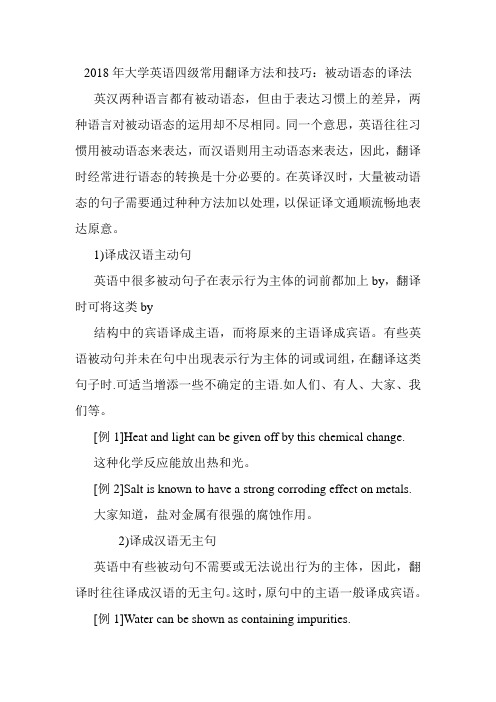
2018年大学英语四级常用翻译方法和技巧:被动语态的译法英汉两种语言都有被动语态,但由于表达习惯上的差异,两种语言对被动语态的运用却不尽相同。
同一个意思,英语往往习惯用被动语态来表达,而汉语则用主动语态来表达,因此,翻译时经常进行语态的转换是十分必要的。
在英译汉时,大量被动语态的句子需要通过种种方法加以处理,以保证译文通顺流畅地表达原意。
1)译成汉语主动句英语中很多被动句子在表示行为主体的词前都加上by,翻译时可将这类by结构中的宾语译成主语,而将原来的主语译成宾语。
有些英语被动句并未在句中出现表示行为主体的词或词组,在翻译这类句子时.可适当增添一些不确定的主语.如人们、有人、大家、我们等。
[例1]Heat and light can be given off by this chemical change.这种化学反应能放出热和光。
[例2]Salt is known to have a strong corroding effect on metals.大家知道,盐对金属有很强的腐蚀作用。
2)译成汉语无主句英语中有些被动句不需要或无法说出行为的主体,因此,翻译时往往译成汉语的无主句。
这时,原句中的主语一般译成宾语。
[例1]Water can be shown as containing impurities.可以证明,水含有杂质。
[例2]That question neednt be brought in.不必牵涉这个问题。
3)译成汉语被动句有些英语被动句着重被动的动作。
因此,翻译时仍应译成被动句,以突出原句的被动意义。
由于汉语的动词无词形变化,所以只能通过添加词的方法来表示被动。
常添加的词一般有被、由、受、给、为等。
[例1]She was blamed for everything her sisters did.她为妹妹们所做的事而受指责。
[例2]An invitation to come to the home for a meal or a longer visit is usually given by the hostess.通常,邀请客人到家吃饭或是作较长时间的访问,都是由女主人发出的。
英语翻译的技巧及注意事项
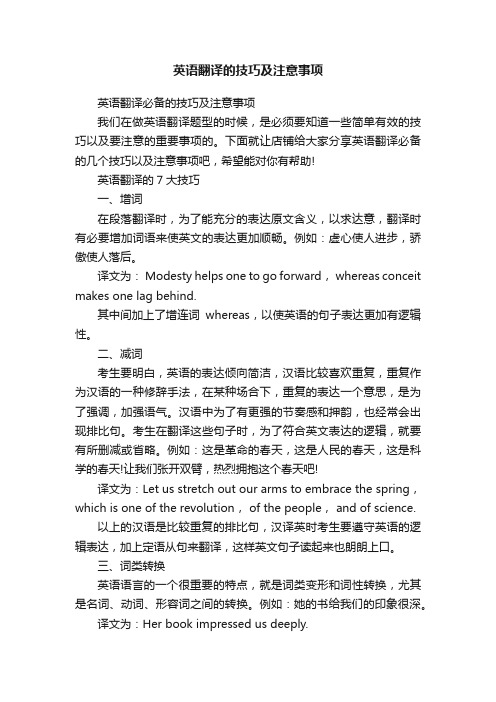
英语翻译的技巧及注意事项英语翻译必备的技巧及注意事项我们在做英语翻译题型的时候,是必须要知道一些简单有效的技巧以及要注意的重要事项的。
下面就让店铺给大家分享英语翻译必备的几个技巧以及注意事项吧,希望能对你有帮助!英语翻译的7大技巧一、增词在段落翻译时,为了能充分的表达原文含义,以求达意,翻译时有必要增加词语来使英文的表达更加顺畅。
例如:虚心使人进步,骄傲使人落后。
译文为: Modesty helps one to go forward, whereas conceit makes one lag behind.其中间加上了增连词whereas,以使英语的句子表达更加有逻辑性。
二、减词考生要明白,英语的表达倾向简洁,汉语比较喜欢重复,重复作为汉语的一种修辞手法,在某种场合下,重复的表达一个意思,是为了强调,加强语气。
汉语中为了有更强的节奏感和押韵,也经常会出现排比句。
考生在翻译这些句子时,为了符合英文表达的逻辑,就要有所删减或省略。
例如:这是革命的春天,这是人民的春天,这是科学的春天!让我们张开双臂,热烈拥抱这个春天吧!译文为:Let us stretch out our arms to embrace the spring,which is one of the revolution, of the people, and of science.以上的汉语是比较重复的排比句,汉译英时考生要遵守英语的逻辑表达,加上定语从句来翻译,这样英文句子读起来也朗朗上口。
三、词类转换英语语言的一个很重要的特点,就是词类变形和词性转换,尤其是名词、动词、形容词之间的转换。
例如:她的书给我们的印象很深。
译文为:Her book impressed us deeply.在此翻译中汉语中的名词印象转化成英语中的动词impress。
四、语态转换语态分为被动语态和主动语态,汉语中主动语态使用率较高,英语中被动语态的使用率较高。
被动语态的译法

被动语态的译法一、译成汉语主动句(一)、原文中的主语在译文中仍作主语The whole country was armed in a few days.几天之内全国就武装起来了。
The sense of inferiority that he acquired in his youth has never been totally eradicated.他在青少年时期留下的自卑感,还没有完全消除。
On their domestic stations events in the Middle East were dismissed briefly.在他们国内电台的广播中,中东事件只是轻描淡写地报道了一下。
练习:This liquid became mixed with the salt at room temperature.这液体在室温下和盐混合了。
It should have been obvious that the plan would have to be scrapped.本来就很明显,这项计划得取消。
Most of the questions have been settled satisfactory, only a few questions of secondary importance remain to be discussed.大部分问题已经圆满地解决了,只剩下几个次要问题需要讨论。
(二)、原文中的主语在译文中作宾语Mr. Billings cannot be deterred from his plan.(人们)不能阻止比林斯先生实行他的计划。
It would be astonishing if that loss were not keenly felt.如果(人们)不强烈地感到损失,那倒是奇怪了。
By the end of the war, 800 people had been saved by the organization, but at a cost of over 200 Belgian and French lives.大战终了时,这个组织拯救了800人,但那是以200多比利时人和法国人的生命为代价的。
英语被动语态的翻译
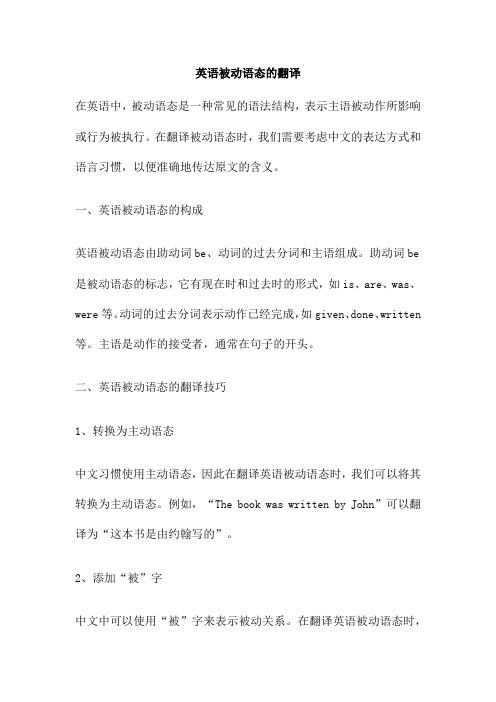
英语被动语态的翻译在英语中,被动语态是一种常见的语法结构,表示主语被动作所影响或行为被执行。
在翻译被动语态时,我们需要考虑中文的表达方式和语言习惯,以便准确地传达原文的含义。
一、英语被动语态的构成英语被动语态由助动词be、动词的过去分词和主语组成。
助动词be 是被动语态的标志,它有现在时和过去时的形式,如is、are、was、were等。
动词的过去分词表示动作已经完成,如given、done、written 等。
主语是动作的接受者,通常在句子的开头。
二、英语被动语态的翻译技巧1、转换为主动语态中文习惯使用主动语态,因此在翻译英语被动语态时,我们可以将其转换为主动语态。
例如,“The book was written by John”可以翻译为“这本书是由约翰写的”。
2、添加“被”字中文中可以使用“被”字来表示被动关系。
在翻译英语被动语态时,我们可以添加“被”字来明确动作的接受者。
例如,“The car was hit by a bus”可以翻译为“这辆车被公交车撞了”。
3、使用“受”、“遭”等词除了使用“被”字外,中文还可以使用“受”、“遭”等词来表示被动关系。
例如,“The city was attacked by the enemy”可以翻译为“这个城市遭到了敌人的攻击”。
4、省略“被”字在一些情况下,中文可以省略“被”字,直接将主语作为动作的接受者。
例如,“The house was cleaned”可以翻译为“房子被打扫了”。
翻译英语被动语态时,我们需要根据中文的语言习惯和表达方式进行适当的调整,以便准确地传达原文的含义。
考研英语中被动语态的翻译技巧引言在考研英语中,被动语态是考生必须掌握的一个重要语法结构。
由于中英文的语言习惯差异,被动语态的翻译成为了很多考生的难点。
本文将详细讲解考研英语中被动语态的用法和特点,并介绍相应的翻译技巧,帮助考生更好地应对翻译中的挑战。
知识点讲解被动语态是英语中常见的语法结构之一,通常用于强调动作的承受者。
英译汉常用的方法和技巧

英译汉常用的方法和技巧英译汉常用的方法和技巧引导语:英译汉常用的方法和技巧,由应届毕业生培训网整理而成,谢谢您的阅读,祝您阅读愉快。
一、词义的选择、引申和褒贬1.一词多义(Polysemy)regularregular reading / regular job / regular flight / regular visitor / regular speed / regular army / gasolinedelicatedelicate skin / porcelain / upbringing / living / health / stomach / vase / diplomatic question / difference / surgical operation / ear for music / sense of smell / touch / food2.注意有线词的词义He once again imparted to us his great knowledge, experience and wisdom.He now saw plainly the meaning of all. In the beginning, he had got a job the first day; but now he was second-hand, a damaged article, and they did not want him. They had got the best out of him, and now they had thrown him away. The situation had now become desperate. Then came another incident.3.词义的引申(Extension or Generalization)1) Extend the word meaning to cover an abstraction conceptHis novel is a mirror of the times.The OED is the final court of appeal in all matters concerning English words.Sam knows he can depend on his family, rain or shine.2) Extend the word meaning to cover a specific conceptIn two years, he was a national phenomenon.Public opinion is demanding more and more that something be done about noise.Mary’s father, by his first marriage, had a daughter, Jane, Mary’s half-sister.4.词义的褒贬(Commendatory and Derogatory)The reckless driver died in the traffic accident.Poor Joe’s panic lasted for two or three days; during which he did not visit the house.It was time to hold a court and the subject for discussion was the future of that prisoner.John was an aggressive salesman who did his job quite well.The invaders met a stubborn resistance from the local people.She was vexed by the persistent ringing of the phone.5.ExercisesI have no opinion of that sort of man.She put five dollars into my hand. “You have been a great man today.”I’m afraid you’re being too particular about your food.I was the youngest son, and the youngest but two.The picture flattered her.The country not agreeing with her, she returned to England.二、词类转译法(一)转译成动词(1)名词转译动词(Convert nouns into verbs)My admiration for him grew more.He said he did not know whether Tom was ready for a showdown.To some extent it gets into the question of the chicken or the egg.The Nobel prizes in physics and chemistry were rewarded to Americans, giving the U.S. a clean sweep of all the 1976 Nobel prizes in the sciences.Television is the transmission and reception of image of moving objects by radio waves.In the absence of friction, the vehicle could not even be started.Vietnamese War is a drain on American resources.I am no drinker, nor smoker.The application of electronic computers makes a tremendous rise in labor productivity.(2)介词转译成动词(Convert prepositions into verbs)There are many substances through which electric currents will not flow at all.We are fortunate in our opponent.Captain Ford was between the sheets by 9 last night.The most he is after at this time is a chance to get more money.I tried to talk him out of the idea, but he was unpleasant.Millions of the people in the mountainous areas are finally off poverty.“Coming!” Away she skimmed over the lawn, up the path, up the steps, across the veranda, and into the porch.(3)形容词转译成动词(Convert adjectives into verbs)He said the meeting was informative.They were news-hungry.It was a very informative meeting.(4)副词转译成动词(Convert adverbs into verbs)The experiment in chemistry was ten minutes behind.It has snowed over.Why should we let in foreign goods when Americans walk the streets because they can’t sell their own goods?(二)转译成名词(1)动词转译成名词(Convert verbs into nouns)She knows what’s what.They thought differently.TV differs from radio in that it sends and receives pictures.The computer is chiefly characterized by its accurate and rapid computations.He roared, which threatened his enemies away.The man I saw at the party looked and talked like an American.(2)形容词转译成名词The new treaty would be good for ten years.The language of the poem is colloquial, yet it’s deep in its understanding of human emotions.Then the monkeys were trained according to different plans so as to make them highly individualized.Everyday experience shows us that heavy objects are more stable than light ones.(三)转译成形容词名词转译成形容词Their physical experiment was a success.The nuclear power system designed in China is of great precision.Said a New York bullion trader, “The market’s gone banana.”He found on this issue, as on Taiwan, an identity of approach.In Europe, his name was well known, if not a household word.(四)其他词类转译副词转译成名词The air-conditioning unit is shown schematically on Page 2.Oxygen is one of the important elements in the physical world, it is very active chemically.The image must be dimensionally correct.三、被动语态的`译法(一)大量的英语被动句要化成汉语的主动句1. He said the pact had now been reduced to less than a shadow.2. She had no knowledge of this and had not been consulted on these reported plans.3. What has just been written runs the risk of oversimplification.4. Many voices have been raised demanding the setting up of an Arab common market.(二)以by为着眼点,进行多种译文1. But real influence is not built up by striking attitude or by throwing insults.2. Its sincerity is illustrated not only by its proposal but also by its deeds.3. What I like best are the stern cliffs, with ranges of mountains soaring behind them, full of possibilities, peaks to be scaled only by the most daring.4. Many expect that he will be outed by one of his rivals.5. He said he was assured by the State Department that the U.S. is willing to normalize relations with his country.(三)“it + be + p.p. + that clause”的句型,常以下列形式表达1. It should be noted that he and she were academically more than just friends.2. It should be understood that to err is human.(四)汉译中需用被动式时,也最好多找一些字眼来取代“被”字1. The visitor was flattered and impressed.2. Everybody was fed up with her gossip.3. He was set upon by two naked men.4. If the expenditure is really necessary, the money can be found somehow.5. He was released immediately after Batista fled Cuba.四、增词法(一)名词、动名词前增补动词1. We often go to the school-run factory for labor.2. Testing is a complicated problem and long experience is required for its mastery.(二)英语抽象名词的翻译1. He was still reluctant to talk substance.2. Many changes take place during the transformation.3. Her indifference kept all the visitors away from the exhibition hall.4. From the evaporation of water people know that liquid can turn into gases under certain conditions.(三)将具体形象的词译成该形象所具有的属性和特征,这是一种引申,需增词1. It was a Godsend to him.2. If you dare to play the fox with me, I’ll shoot you at once.(四)增添“概括”性的词1. He had slept there before, in July and again in October.2. Their host carved, poured, served, cut bread, talked, laughed, proposed health.3. The government is doing its best to ease the tension in that area.4. Proteins are composed of carbon, hydrogen, oxygen andnitrogen.5. This report summed up the achievements in technology and education.(五)英文中为避免重复而省略之词,汉译时需补上,作必要的重复1. I hope that the meeting will not be too long, for it will only waste time.(六)汉译文根据原文意思增加一些必要的解释性文字1. And he launched into a speech, eloquently advocating his university of the future.2. Those were the words that were to make the world blos som for, “like Aaron’s rod, with flowers”.(七)增补量词1. Repeat the experiment using a wooden ruler, a piece of glass, a metal spoon, a coin, a piece of paper, a pin, a plastic comb,a key, a pencil, a tin lid and a rubber eraser.2. On April 24th 1970, China successfully launched its first man-made earth satellite.(八)增补表示复数含义的词1. But that the old workers helped us, we should have failed.2. The moving parts of a machine are often oiled so that friction may be greatly reduced.【英译汉常用的方法和技巧】。
翻译英语句子的要点

翻译英语句子的要点由于翻译部分的句型结构和阅读理解的较难句型基本类似,考试重点如出一辙,为了让大家更好的理解阅读理解真题文章,提高做题正确率,下面小编就跟你们详细介绍下翻译英语句子的要点,希望对你们有用。
翻译英语句子的要点如下:翻译英语句子的要点(一)被动语态翻译法1) 变为汉语的主动形式。
Eg:It leads the discussion to extremes at the outset: it invites you to think that animals should be treated either with the consideration humans extend to other humans, or with no consideration at all.这种说法从一开始就将讨论引向两个极端,它使人们认为应该这样对待动物:要么像对待人类自身一样关切体谅,要么完全冷漠无情。
2) 译成具有被动意义的汉语结构。
Eg:For all the help this computer may provide, it should not be seen as a substitute for fundamental thinking and reasoning skills.尽管计算机可以提供那么多的帮助,它却不应该被看作是基本的思维和推理技巧的替代物。
Eg:How well the predictions will be validated by later performance depends upon the amount, reliability, and appropriateness of the information used and on the skill and wisdom with which it is interpreted.这些预测将在多大程度上为后来的表现所证实取决于所用信息的数量、可靠程度、适宜程度以及用来解释这些信息的技巧与才智。
考研英语中被动语态的翻译技巧
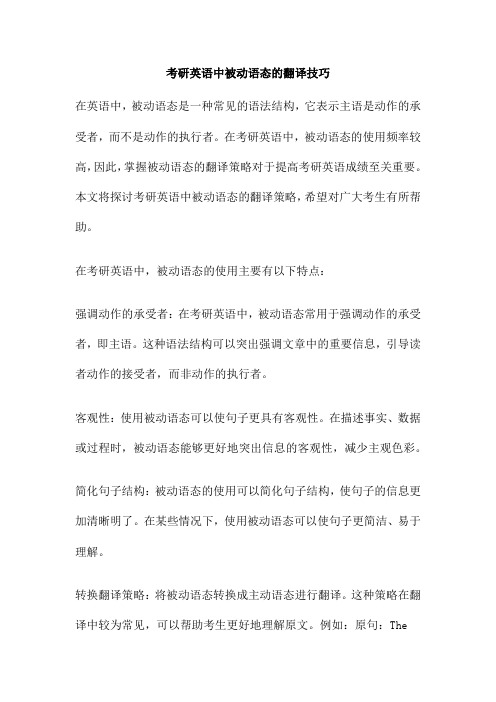
考研英语中被动语态的翻译技巧在英语中,被动语态是一种常见的语法结构,它表示主语是动作的承受者,而不是动作的执行者。
在考研英语中,被动语态的使用频率较高,因此,掌握被动语态的翻译策略对于提高考研英语成绩至关重要。
本文将探讨考研英语中被动语态的翻译策略,希望对广大考生有所帮助。
在考研英语中,被动语态的使用主要有以下特点:强调动作的承受者:在考研英语中,被动语态常用于强调动作的承受者,即主语。
这种语法结构可以突出强调文章中的重要信息,引导读者动作的接受者,而非动作的执行者。
客观性:使用被动语态可以使句子更具有客观性。
在描述事实、数据或过程时,被动语态能够更好地突出信息的客观性,减少主观色彩。
简化句子结构:被动语态的使用可以简化句子结构,使句子的信息更加清晰明了。
在某些情况下,使用被动语态可以使句子更简洁、易于理解。
转换翻译策略:将被动语态转换成主动语态进行翻译。
这种策略在翻译中较为常见,可以帮助考生更好地理解原文。
例如:原句:Thedecision was made by the committee.翻译:委员会做出了决定。
调整语序策略:在不改变原句结构的情况下,通过调整语序来使翻译更加通顺。
例如:原句:The book was written by him.翻译:这本书是他写的。
补充细节策略:在不显露太多信息的情况下,补充一些必要的信息来让读者更好地理解翻译。
例如:原句:The door was locked by the guard.翻译:门被警卫锁上了。
(补充了“被警卫”)实践通过举例考研英语试题,具体实践被动语态的翻译策略。
例如,考研英语试题中有这样一道题目: The medical care provided to the patient was criticized by her family.转换翻译策略:The patient's medical care was criticized by her family. (将被动语态转换成主动语态)调整语序策略:The care provided to the patient by medical staff was criticized by her family. (调整语序,使翻译更通顺)补充细节策略:The patient's medical care, which included both physical and mental aspects, was criticized by her family for its effectiveness and quality. (补充必要信息,帮助读者更好地理解翻译)在考研英语中,被动语态的翻译策略对于考生来说非常重要。
- 1、下载文档前请自行甄别文档内容的完整性,平台不提供额外的编辑、内容补充、找答案等附加服务。
- 2、"仅部分预览"的文档,不可在线预览部分如存在完整性等问题,可反馈申请退款(可完整预览的文档不适用该条件!)。
- 3、如文档侵犯您的权益,请联系客服反馈,我们会尽快为您处理(人工客服工作时间:9:00-18:30)。
翻译的基本技巧——语态转换译法语态转换译法1顺译法1.1顺译成被动句1.2顺译成主动句2倒译法2.1 把by 后的宾语倒译成汉语的主语2.2把其他介词后的宾语倒译成汉语的主语2.3倒译成汉语的无主句3分译法一、顺译法既保留原文的主语,又要使译文主要成分的顺序和原文大体一致的翻译方法就叫顺译法。
1 顺译法(Translation in Original Order)1. 1 顺译成被动句A.译成“被” 字所谓“被”字句,就是在汉语的动词前面加上一个“被” 字来表示被动的句子。
主要表示这个动作不利于受事者或这个情况有点特殊,或者出乎意料。
加上“被” 字以引起读者的注意并表示“被”这一动作动作接受者(受事者)是不乐意或不情愿接受的。
例1:Vitamin C is destroyed when it is overheated.【译文】维生素C 受热过度就会被破坏。
例2:Once the flower has been pollinated and fertilized, the plant provides the newly formed seeds with a reserve of food materials, which will be needed when they themselves germinate. 【译文】花一旦被授了粉并受了精,植株就会对新生种子提供养料贮藏,以备种子未来发芽之需。
例3:She thought all was fair and legal, and never dreamt she was going to be entrapped into a feigned union with a defrauded wretched, already bound to a bad, mad, and imbruted partner! (Charlotte Bront?: Jane Eyre)【译文】她以为一切都是公正合法的,做梦也没想到过自己竟会被诱入欺诈婚姻的圈套,跟一个骗子、疯子、十足的坏蛋缔结姻缘。
B.译成“挨” 字句“挨”仅用于翻译该动作是对动作接受者(受事者)不利或不好的句子。
例1:The boy was criticized yesterday. 【译文】这孩子昨天挨了一顿批评。
例2:I was caught in the downpour. 【译文】我在大雨中挨浇了。
C.译成“给” 字句“给”也是用于翻译该动作对动作接受者(受事者)不愉快或不愿接受的句子。
例1:Our clothes were soaked with sweat.【译文】我们的衣服给汗水湿透了。
例2:The crops were washed away by the flood. 【译文】庄稼给大水冲跑了。
例3:Your car was towed away by a towing truck from Lewis Company. 【译文】路易斯公司的一辆拖车把你的汽车给拖走了。
D.译成“叫、让、由、受、遭到、受到、予、予以、加、加以、引以、为⋯⋯所、经⋯⋯所” 等字句,用以加强说话、表达语气。
例1:You have been wetted in the rain. 【译文】你叫雨淋湿了。
例2:The γ -rays are not affected by an electric field.【译文】γ射线不受电场影响。
例3:A lot of houses and buildings, roads and bridges were damaged in the seaquake. 【译文】许多房屋建筑、道路桥梁在这次海啸中遭到破坏。
例4:It must be dealt with at the appropriate time with appropriate means. 【译文】这件事必须在适当的时候用适当的手段予以处理。
课堂互动1:翻译下列句子, 顺译成被动句。
1.Those who perform deeds of merit will be rewarded. 【译文】立功的人将受到奖励。
2.A program called a compiler was written by an expert in machine code and is stored in the computer.【译文】编译程序先由专家用机器代码编码写好,然后储存在计算机中。
3.Translation techniques should be paid enough attention to. 【译文】翻译技巧应予以足够的重视。
4.The applicants interviewed are required to hand in some necessary material. 【译文】被谈过话的申请人,要求交上必要的材料。
5.Television keeps us informed about current events at home and abroad. 【译文】电视使我们了解国内外大事。
1. 2 顺译成主动句A.顺译成形式是主动,意义上是被动的句子把英语句子顺译成主动句,其形式是主动,但从意义和逻辑关系上看还是被动句。
例1:Love can not be forced.【译文】爱情不能强求。
例2:Love and cough cannot be hidden. 【译文】爱情和咳嗽都无法隐藏。
例3:My holidays afternoons were spent in rambling about the surrounding country. (Washington Irving)【译文】每逢假日的下午,我总要漫步周围的乡村。
例4:Illness must be correctly diagnosed before they can be treated with medicine. 【译文】疾病必须先确诊,再用药。
B.改变原文的谓语动词,顺译成主动句如果把英语的被动句译成汉语的被动句,则不符合汉语的语言习惯,所以常可将英语的被动句顺译成汉语的主动句,原文的谓语动词是被动形式,可转变谓语,顺译成汉语的主动形式。
例1:The teacher was satisfied with the answer. 【译文】老师对回答感到满意。
例2:I am told you are careless. 【译文】听说你很粗心大意。
例3:The long river is originated from that high mountain. 【译文】这条大河发源于那座山。
C.顺译成“是⋯⋯的” 结构英语句子要着重表示的不是受事者受到了某个行动这样一个事实本身,而是与这个行动有关的一些具体情况,如时间、地点、方式、方法等。
也就是说,句子里强调的是行动的静态而不是动态的含义。
这样就可以顺译成汉语的“是⋯⋯的”的句式。
其框架为“受事者—是—动词—的” 。
例1:That ridiculous idea was put forward by his brother. 【译文】这个怪念头是他哥哥想出来的。
例2:The credit system in America was first adopted by Harvard University in 1872. 【译文】美国的学分制是1872 年在哈佛大学首先实施的。
例3:Poetry was chanted to the accompaniment of the lyre. 【译文】诗歌吟唱时是由七弦琴伴奏的。
例4:The left ear is controlled by the right side of the brain. 【译文】左耳是由大脑的右侧控制的。
课堂互动2:翻译下列句子, 顺译成主动句1.This is a question to be answered at once. 【译文】这是一个要立即回答的问题。
2.We are deeply touched by the hero ' s loyalty to the cause. 【译文】我们深为英雄忠于事业的精神所感动。
3.The novels of Dickens have already been translated into many languages. 【译文】狄更斯的小说已经译成了好几种语言。
4.The discovery is highly appreciated in the circle of agricultural science. 【译文】这一发现在农业科学界得到很高的评价。
5.Wells and spring are supplied with underground water. 【译文】井水和泉水都是地下水。
6.I was received by a tall, lithe, vibrant woman in her 70 ' s, white-haired, and still beautiful. 【译文】接见我的是一位高挑轻盈、满头银发的女人。
虽然年逾古稀,却依然神采奕奕、风韵犹存。
2. 倒译法(Translation in Reverse Order) 倒译法就是将英语被动句的主语汉译成宾语的翻译方法。
倒译法又分完全倒译法和部分倒译法。
完全倒译法是把原文by 或其他介词后的宾语倒译成汉语的主语;部分倒译法译出的汉语句子常是无主句。
2. 1 把by 后的宾语倒译成汉语的主语例1:Yet, only a part of this energy is used by man.【译文】然而,人类只利用了这种能量的一部分。
例2:Rivers are controlled by dams. 【译文】拦河大坝把河流控制住了。
例3:We are brought freedom and happiness by socialism. 【译文】社会主义给我们带来了自由和幸福。
例4:Light and heat can be given to us by the sun. 【译文】太阳供给我们光和热。
例5:At least two quarts of water are required daily by a normal individual. 【译文】一个正常的人每天至少需要两夸脱的水。
2. 2 把其他介词后的宾语倒译成汉语的主语例1:Heat is removed from the body during sweating. 【译文】出汗时人体散发热量。
